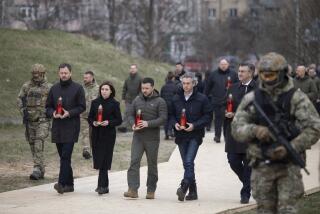Belgrade Hinders War Crimes Probe, Official Says
- Share via
PRISTINA, Yugoslavia — The new chief prosecutor for an international tribunal said Friday that the Yugoslav government is obstructing the investigation of war crimes committed against Serbs.
Full investigation of cases in which Serbs were the victims rather than the accused has not been possible because Yugoslav President Slobodan Milosevic’s government has blocked investigators from entering most areas of Serbia, Carla del Ponte told a news conference here. She urged Milosevic to reverse that year-old policy.
Yugoslav resistance to such visits is not surprising. Milosevic and four members of his government were indicted by the tribunal in May on charges of crimes against humanity in the slayings and deportations of ethnic Albanians in Kosovo. Del Ponte said Thursday that the Yugoslav leaders may face additional indictments for genocide and offenses allegedly committed during earlier conflicts in the neighboring nations of Croatia and Bosnia-Herzegovina.
If Del Ponte’s investigators at work in Kosovo are allowed into other areas of Serbia to interview victims of atrocities committed by ethnic Albanians, that access could help the tribunal develop evidence against Milosevic and his top aides.
Kosovo, which is now under United Nations control, is a province of Serbia, the dominant republic in Yugoslavia.
Since June, when international peacekeepers entered Kosovo after a 78-day NATO air campaign, the tribunal has concentrated on investigating war crimes allegedly committed by Serbs, gathering physical evidence from the sites of mass graves and other crime scenes in Kosovo, Del Ponte said at the Friday news conference.
But with the approach of winter, field work--such as further exhumations--will be put off until spring. During the coming months it “will be possible for my investigators to focus more on the interviewing of relevant witnesses, including those persons who may have information about crimes committed against Serb victims during the period of armed conflict,” Del Ponte said.
“One major difficulty facing us, however, is our inability to gain access to Serb witnesses and victims, many of whom are now in Serbia,” Del Ponte added. “My investigators have not been able to enter Serbia for 12 months now, and this is a severe impediment to our ability to investigate cases where Serbs may have been victims, not only in Kosovo but in Croatia and Bosnia as well.”
Yugoslav forces in Kosovo drove about 1 million ethnic Albanians from their homes in spring during the North Atlantic Treaty Organization air campaign. When ethnic Albanians returned under the protection of peacekeepers, more than 150,000 Serbs in turn fled Kosovo for other areas of Yugoslavia, many charging that they too were victims of war crimes.
Since mid-June, about 400 forensic experts from 15 nations have completed work at 150 of 500 reported mass graves and other sites of war crimes in Kosovo, said Del Ponte, a former attorney general in Switzerland who has headed the U.N. tribunal since Sept. 15.
Officials of the International Criminal Tribunal for the Former Yugoslavia, based in The Hague, have said that, although work at grave sites in Kosovo will be suspended for the winter, the use of modern scientific techniques means that the delay in examining additional bodies will not lead to a significant loss of evidence.
The charge of genocide being considered against Milosevic and his aides differs from the accusation that they committed crimes against humanity. By legal definition, genocide means that the perpetrator of criminal acts “had the intention to destroy, either in whole or in part, an ethnic race or ethnic group,” deputy prosecutor Graham Blewitt said at the news conference.
Del Ponte responded with “no comment now” when asked if ethnic Albanian leaders Hashim Thaci and Agim Ceku--who were key figures of the recently disbanded separatist Kosovo Liberation Army--might be the targets of possible indictments related to cases involving Serbian victims.
Del Ponte’s trip overlapped with a visit by the two key figures in the European Union’s foreign policy structure, both new in their jobs: Javier Solana, the head of foreign and security policy, and Chris Patten, the external affairs commissioner.
The EU plans to spend $500 million in Kosovo next year, Patten said.
More to Read
Sign up for Essential California
The most important California stories and recommendations in your inbox every morning.
You may occasionally receive promotional content from the Los Angeles Times.













